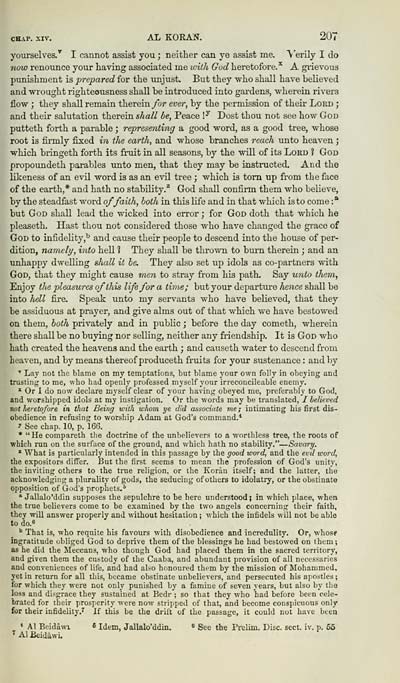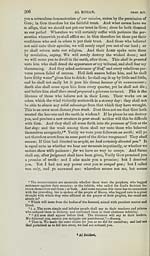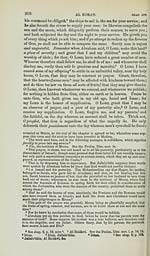Download files
Complete book:
Individual page:
Thumbnail gallery: Grid view | List view

CHAP. XIV. AL KORAN. 207
yourselves.' I cannot assist you ; neitlier can ye assist me. "V'erily I do
now renounce your having associated me icitU God heretofore.^ A gi-ievous
punishment is prepared for the imjust. But they who shall have believed
and wrought righteousness shall be introduced into gardens, -wherein rivers
flow ; they shall remain therein /or ever, by the permission of their Lord ;
and their salutation therein shall be, Peace !^ Dost thou not see how God
putteth forth a parable ; representing a good word, as a good tree, whose
root is firmly fixed in tlie earth, and whose branches reach unto heaven ;
which bringeth forth its fniit in all seasons, by the will of its Lord ? God
propoundeth parables unto men, that they may be instructed. And the
likeness of an evil word is as an e^'il tree ; which is torn up from the face
of the earth,* and hath no stability.^ God shall confirm them who believe,
by the steadfast word of faith, both in this life and in that which is to come :*
but God shall lead the wicked into error ; for God doth that which he
pleaseth. Hast thou not considered those who have changed the gi-ace of
God to infidelity,^ and cause their people to descend into the house of per-
dition, namely, into heU 1 They shall be thrown to bum therein ; and an
unhappy dwelling shall it be. They also set up idols as co-partners with
God, that they might cause men to stray from his path. Say unto them,
Enjoy the pleasures of this life for a time; but your departm-e hence shall be
into hdl fire. Speak unto my servants who have believed, that they
be assiduous at prayer, and give alms out of that which we have bestowed
on them, both privately and in public ; before the day cometh, wherein
there shall be no buying nor selling, neither any friendship. It is God who
hath created the heavens and the earth ; and causeth water to descend from
heaven, and by means thereof produceth fruits for your sustenance : and Ijy
' Lay not the blame on my temptations, but blame your own folly in obeying and
trasting to me, who had openly professed myself your irreconcileable enemy.
* Or I do now declare myself clear of your having obeyed me, preferably to God,
and worshipped idols at my instigation. Or the words may be translated, / believed
not heretofore in that Being with whom ye did associate me; intimating his first dis-
obedience in refusing to worship Adam at God's command.*
y See chap. 10, p. 166.
* "He compareth the doctrine of the unbelievers to a worthless tree, the roots of
which run on the surface of the ground, and which hath no stability." — Savary.
* What is particularly intended in this passage by the good word, and the evil word,
the expositors differ. But the first seems to mean the profession of God's unity,
the inviting others to the true religion, or the Koran itself; and the latter, the
acknowledging a plurality of gods, the seducing of others to idolatry, or the obstinate
opposition of God's prophets.*
* Jallalo'ddin supposes the sepulchre to be here understood ; in which place, when
the true believers come to be examined by the two angels concerning their faith,
they will answer properly and without hesitation ; which the infidels will not be able
to do.«
^ That is, who requite his favours with disobedience and incredulity. Or, whos?
ingratitude obliged God to deprive them of the blessings he had bestowed on them;
as he did the Meccans, who though God had placed them in the sacred tcmtory,
and given them the custody of the Caaba, and abundant provision of all necessaries
and conveniences of life, and had also honoured them by the mission of Mohammed,
yet in return for all this, became obstinate unbelievers, and persecuted his apostles ;
for which they were not only punished by a famine of seven years, but also by the
loss and disgrace they sustained at Bedr ; so that they who "had before betn cele-
brated for their prosperity were now stri])ped of that, and become conspicuous only
for their infidelity.^ If this be the drift of the passage, it could not have bten
' Al Beidawi 6 Idem, Jallalo'ddin. ^ See the Prelim. Disc. sect. iv. p. 55
'' Al iJeidawi.
yourselves.' I cannot assist you ; neitlier can ye assist me. "V'erily I do
now renounce your having associated me icitU God heretofore.^ A gi-ievous
punishment is prepared for the imjust. But they who shall have believed
and wrought righteousness shall be introduced into gardens, -wherein rivers
flow ; they shall remain therein /or ever, by the permission of their Lord ;
and their salutation therein shall be, Peace !^ Dost thou not see how God
putteth forth a parable ; representing a good word, as a good tree, whose
root is firmly fixed in tlie earth, and whose branches reach unto heaven ;
which bringeth forth its fniit in all seasons, by the will of its Lord ? God
propoundeth parables unto men, that they may be instructed. And the
likeness of an evil word is as an e^'il tree ; which is torn up from the face
of the earth,* and hath no stability.^ God shall confirm them who believe,
by the steadfast word of faith, both in this life and in that which is to come :*
but God shall lead the wicked into error ; for God doth that which he
pleaseth. Hast thou not considered those who have changed the gi-ace of
God to infidelity,^ and cause their people to descend into the house of per-
dition, namely, into heU 1 They shall be thrown to bum therein ; and an
unhappy dwelling shall it be. They also set up idols as co-partners with
God, that they might cause men to stray from his path. Say unto them,
Enjoy the pleasures of this life for a time; but your departm-e hence shall be
into hdl fire. Speak unto my servants who have believed, that they
be assiduous at prayer, and give alms out of that which we have bestowed
on them, both privately and in public ; before the day cometh, wherein
there shall be no buying nor selling, neither any friendship. It is God who
hath created the heavens and the earth ; and causeth water to descend from
heaven, and by means thereof produceth fruits for your sustenance : and Ijy
' Lay not the blame on my temptations, but blame your own folly in obeying and
trasting to me, who had openly professed myself your irreconcileable enemy.
* Or I do now declare myself clear of your having obeyed me, preferably to God,
and worshipped idols at my instigation. Or the words may be translated, / believed
not heretofore in that Being with whom ye did associate me; intimating his first dis-
obedience in refusing to worship Adam at God's command.*
y See chap. 10, p. 166.
* "He compareth the doctrine of the unbelievers to a worthless tree, the roots of
which run on the surface of the ground, and which hath no stability." — Savary.
* What is particularly intended in this passage by the good word, and the evil word,
the expositors differ. But the first seems to mean the profession of God's unity,
the inviting others to the true religion, or the Koran itself; and the latter, the
acknowledging a plurality of gods, the seducing of others to idolatry, or the obstinate
opposition of God's prophets.*
* Jallalo'ddin supposes the sepulchre to be here understood ; in which place, when
the true believers come to be examined by the two angels concerning their faith,
they will answer properly and without hesitation ; which the infidels will not be able
to do.«
^ That is, who requite his favours with disobedience and incredulity. Or, whos?
ingratitude obliged God to deprive them of the blessings he had bestowed on them;
as he did the Meccans, who though God had placed them in the sacred tcmtory,
and given them the custody of the Caaba, and abundant provision of all necessaries
and conveniences of life, and had also honoured them by the mission of Mohammed,
yet in return for all this, became obstinate unbelievers, and persecuted his apostles ;
for which they were not only punished by a famine of seven years, but also by the
loss and disgrace they sustained at Bedr ; so that they who "had before betn cele-
brated for their prosperity were now stri])ped of that, and become conspicuous only
for their infidelity.^ If this be the drift of the passage, it could not have bten
' Al Beidawi 6 Idem, Jallalo'ddin. ^ See the Prelim. Disc. sect. iv. p. 55
'' Al iJeidawi.
Set display mode to: Large image | Transcription
Images and transcriptions on this page, including medium image downloads, may be used under the Creative Commons Attribution 4.0 International Licence unless otherwise stated. ![]()
| Early Gaelic Book Collections > J. F. Campbell Collection > Koran: or, Alcoran of Mohammed > (361) |
|---|
| Permanent URL | https://digital.nls.uk/77138066 |
|---|
| Description | Volumes from a collection of 610 books rich in Highland folklore, Ossianic literature and other Celtic subjects. Many of the books annotated by John Francis Campbell of Islay, who assembled the collection. |
|---|
| Description | Selected items from five 'Special and Named Printed Collections'. Includes books in Gaelic and other Celtic languages, works about the Gaels, their languages, literature, culture and history. |
|---|

